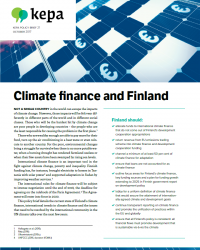Not a single country in the world can escape the impacts of climate change. However, those impacts will be felt very differently in different parts of the world and in different social classes. Those who will be the hardest hit by climate change are poor people in developing countries – the people who are
the least responsible for causing the problem in the first place.
Those who are wealthy enough are able to pay more for their food, turn up the air conditioning in a heat wave or even relocate to another country. For the poor, environmental changes bring a struggle for survival when there is no more potable water, when a burning drought has rendered farmland useless or when their few assets have been swamped by rising sea levels.
International climate finance is an important tool in the fight against climate change, poverty and inequality. Finnish funding has, for instance, brought electricity to homes in Tanzania with solar power2 and supported adaptation in Sudan by improving weather services.
The international rules for climate finance will be subject to intense negotiation until the end of 2018, the deadline for agreeing on the rulebook of the Paris Agreement. The Agreement will enter into force in 2020.
This policy brief details the current state of Finland’s climate finance, international trends in climate finance and the issues that need to be resolved by the international community in the UN climate talks over the next few years.
